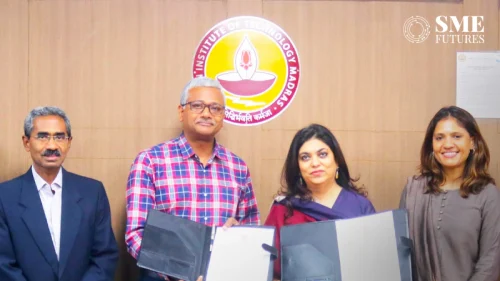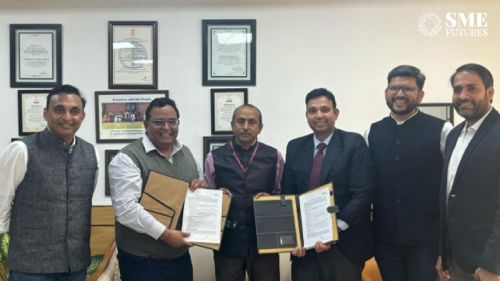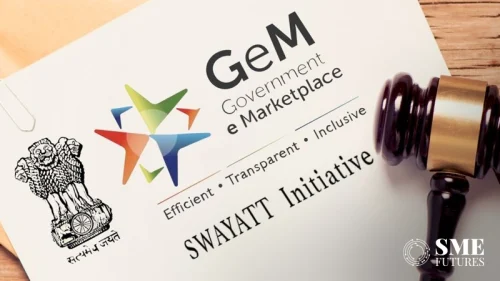The Union Cabinet on Thursday approved proposals to set up three semiconductor plants, including a mega fab by Tata Group, at a cumulative investment of Rs 1.26 lakh crore, as India moves to position itself as a global powerhouse in chip manufacturing.
The government is offering incentives of up to Rs 76,000 crore to boost domestic manufacturing of semiconductors, which are essential components of electronic devices and find usage in mobile phones, laptops, refrigerators, washing machines and automobiles, among others.
The three units approved for support under the scheme will make chips for various sectors, including defence, automobiles and telecommunications, and will begin construction within the next 100 days, Minister for Electronics and IT Ashwini Vaishnaw told reporters after the cabinet meeting.
“This is a decisive moment for India and underlines the Atmanirbhar Bharat promise. By 2029, India will emerge as a major semiconductor manufacturing hub in the world,” Vaishnaw said, describing the three proposals as a “giant leap” for the country.
Tata Electronics Pvt Ltd will set up a semiconductor fab in partnership with Taiwan’s Powerchip Semiconductor Manufacturing Corp at Dholera’s special industrial region in Gujarat. The plant will have the capacity to produce 50,000 wafers per month and involve an investment of Rs 91,000 crore.
These chips driven by advanced technology will cater to multiple sectors — Power management chips for electric vehicles (EV), telecom, defence, automotive, consumer electronics, display, and power electronics.
Semiconductor is a “foundational” industry touching almost every aspect of life, powering everything from fridges to ACs and cars, aircraft to trains.
The government has also approved a proposal by Tatas to build a greenfield semiconductor assembly and test facility in Jagiroad, Assam. The facility will be built with an investment outlay of Rs 27,000 crore and is expected to generate over 27,000 direct and indirect jobs in the region.
Notably, this will be India’s first semiconductor unit in the Northeast.
Tata Semiconductor Assembly and Test (TSAT) will develop indigenous advanced semiconductor packaging technologies, including flip chip and ISIP (integrated system in package) technologies, with a capacity of 48 million chips per day. The target segments for these would be automotive, electric vehicles, consumer electronics, telecom, and mobile phones, among others.
The third proposal was by CG Power, which in partnership with Renesas Electronics Corp and Stars Microelectronics of Thailand, will set up a unit in Sanand in Gujarat at an investment of Rs 7,600 crore.
Renesas is a leading semiconductor company focussed on specialised chips. It operates 12 semiconductor facilities and is an important player in microcontrollers, analogue, power, and system-on-chip products.
The plant will have a capacity for 15 million chips per day, and CG Power semiconductor unit will manufacture chips for consumer, industrial, automotive and power applications.
Dr Ajai Chowdhry, Founder & Chairman, EPIC Foundation, Founder, HCL says its a pathbreaking announcement as it paves the way for redefining India’s contribution to the global semiconductor industry.
“This is something we have been waiting for the last 40 years and now it’s finally happening. Delighted to note that a Semiconductor Fab with 50,000 wfsm capacity is being put up by Tata Electronics Private Limited (“TEPL”) along with two semiconductor ATMP units being set up by Tata Semiconductor Assembly and Test Pvt Ltd (“TSAT”) in Morigaon, Assam and another one which is a joint venture between Renesas Electronics Corporation and CG Power in Sanand, Gujarat. In addition to bolstering India’s Semiconductor Mission effort, all three entities will significantly contribute to the nation’s employment creation. I truly believe this step will go a long way in the creation of a thriving semiconductor ecosystem in the nation for the world,” he said.
The three proposals cumulatively entail investments worth over Rs 1.26 lakh crore. The three proposals, along with the Micron unit that was approved earlier, will utilise broadly Rs 59,000 crore of support out of the Rs 76,000 crore incentives. In the near future, more semiconductor proposals are expected to come up, the minister said.
In June last year, the Cabinet had approved a proposal of Micron for setting up a semiconductor unit in Sanand, Gujarat.
India currently imports most of its semiconductors but the government wants to change that through domestic manufacturing.
Meanwhile, Tata Group, in a statement, said that Tata Electronics’ Rs 91,000 crore semiconductor fab in Dholera, Gujarat, in partnership with PSMC, will generate over 20,000 direct and indirect skilled jobs in the region and construction of the mega unit is expected to begin this year.
The planned unit – India’s first commercial fab, marks Tata Electronics’ entry into the global semiconductor industry. Tata Electronics said it is “proud to lead India’s entry into global semiconductor fabrication”.
Tata Electronics, a wholly-owned subsidiary of Tata Sons, has teamed up with Powerchip Semiconductor Manufacturing Corporation (PSMC) to build India’s first AI-enabled state-of-the-art Fab. Tata Sons Chairman N Chandrasekaran announced Tata Group’s decision to build a semiconductor fab in Dholera during the 20th Vibrant Gujarat Summit last month.
Commenting on the planned semiconductor fab, he said, “Tata Group has a tradition of pioneering many sectors in the country, and we are confident that our entry in semiconductor fabrication will add to this legacy”.
By 2030, the global semiconductor industry is expected to grow to USD 1 trillion and Indian semiconductor demand is expected to cross USD 110 billion.










